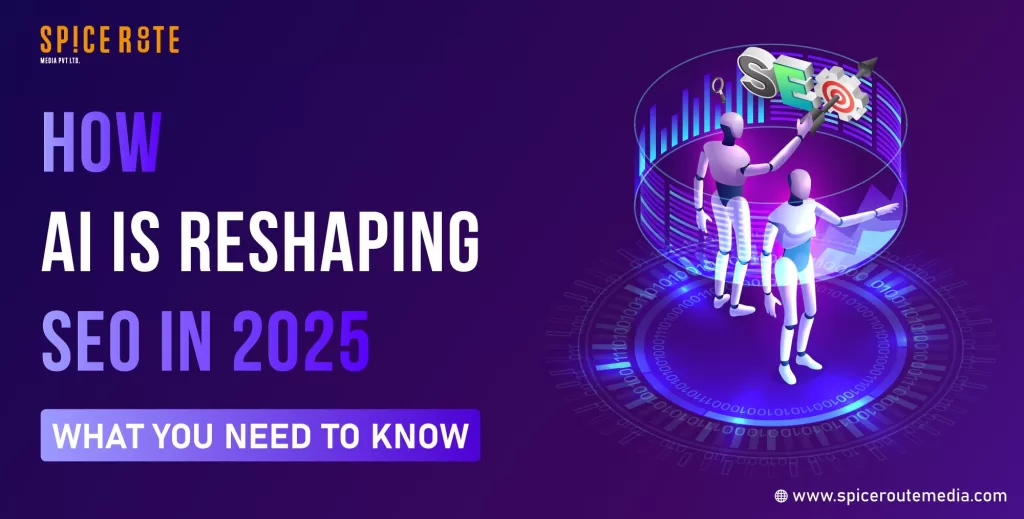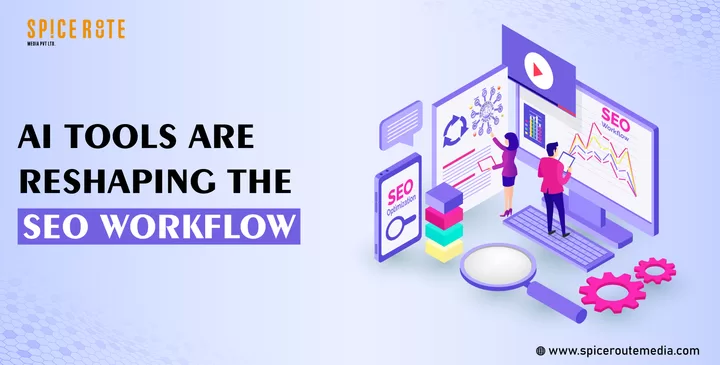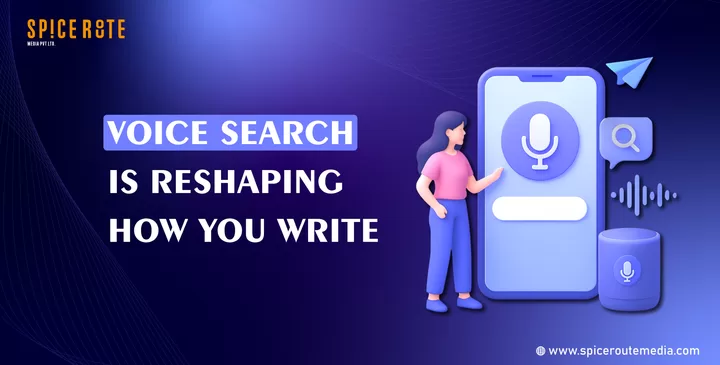Recent Posts
- Why Consistent Posting Beats Viral Content for Business Growth
- Ad Fatigue Explained: Why Your Campaigns Perform Well Then Suddenly Drop
- Why Visitors Leave Your Website in Under 5 Seconds (And How to Fix It)
- SEO reporting in 2025: What Actually Matters
- Building a Scalable Online Presence in 2025: A Step-by-Step Digital Strategy Guide
Recent Comments

AI SEO trends in 2025 are reshaping the way businesses approach search engine optimization. From keyword research to content creation and performance tracking, every part of the strategy is evolving.
If you’re running a marketing agency, managing SEO for clients, or growing your own brand, you need to understand this shift. Here’s what’s happening—and what you should be doing to stay ahead.
Search Algorithms Are Smarter Than Ever
Search engines have moved far beyond simple keyword matching. Tools like Google’s RankBrain and BERT now use machine learning to understand search intent. Instead of relying only on exact phrases, these systems interpret user behavior and context to deliver more accurate results.
Because of this shift, your SEO strategy needs to adapt. While keywords still play a role, relevance and user intent now carry more weight. Each page you create should directly address the real questions your audience is asking.
To do this effectively, use platforms like AnswerThePublic or AlsoAsked to uncover how people phrase their queries. Then, structure your content clearly and incorporate semantic keywords that match what search engines prioritize in top-ranking content.
In short, the way algorithms operate has changed—and your workflow must evolve alongside them.

AI Tools Redefining SEO Workflows in 2025
You no longer have to rely on guesswork or spend hours gathering data.
AI tools like Ahrefs, SEMrush, and Surfer SEO automate:
- Keyword research and clustering
- Competitor content analysis
- On-page SEO suggestions
- Technical audits and reports
This lets your team focus on strategy instead of repetitive tasks. It also shortens turnaround time for campaigns without compromising on quality.
Reports from BrightEdge show a 10% year-over-year growth in AI’s influence on Google search. That means smarter tools—and smarter competitors.
To compete, you need to let AI handle the grunt work so your team can focus on content and creativity.
But content still needs a human layer to make it rank and resonate. AI Content Only Works If You Add the Human Touch. You can generate thousands of words in seconds. But that’s not the goal.
Google’s Search Central Blog makes it clear: content is judged by quality, not the method used to create it. If it’s helpful, accurate, and authoritative, it can rank—AI-generated or not.
What matters is how well it serves the reader.
Examples speak for themselves:
- Scarosso used AI to optimize product pages and saw a 187% increase in orders
- Gadget Flow customized its blog content with AI and achieved 198% organic growth
Source
Use AI to build the foundation. Then refine with human insights, storytelling, and clarity. That’s especially important when you consider how people are searching today.
Voice Search Optimization in the AI SEO Trends Era in 2025
Voice Search Is Changing the SEO Game,People don’t type how they talk. And AI voice assistants like Google Assistant, Siri, and Alexa are changing how users interact with search engines. Voice queries are longer, more conversational, and more location-based.
You need to optimize for questions like: “Where can I find a good vegetarian restaurant open now?”.Instead of just: “vegetarian restaurants near me.”

Voice Search is Researching How you write
- Target long-tail keywords
- Use natural, conversational language
- Write FAQ sections
- Optimize for local SEO
Voice search isn’t a trend. It’s how your users already search. But search is only part of the experience. AI is improving what happens after the click, too.
AI Is Also Powering Better User Experiences. Google tracks what users do on your site.
If they bounce too fast, don’t scroll, or leave after a few seconds, your ranking drops—regardless of your keywords. That’s where AI-based UX tools like Hotjar and Crazy Egg come in. They let you monitor:
- Session duration
- Scroll depth
- Click patterns
- Friction points
Use this data to improve site speed, mobile layout, content formatting, and navigation. A good user experience helps your rankings and keeps users engaged longer.
That’s where AI delivers measurable value. And yes—the numbers back it up. The Results Speak for Themselves. Here’s how brands are using AI to grow faster:
Case Studies: Results from AI SEO Trends 2025
These brands didn’t just add AI—they used it to solve specific problems and scale results.
To do that, you need the right skills in place. SEO Roles Are Changing—Fast. The rise of AI has redefined what SEO professionals do.
Your team now needs to:
- Understand how to use AI tools for content and audits
- Interpret data from predictive analytics dashboards
- Build content with E-E-A-T in mind
- Keep up with real-time algorithm shifts
A Forbes report shows that 90% of marketing leaders plan to invest more in SEO this year—with a focus on AI integration.
That’s not just a tech shift. It’s a people shift.
Upskill your team. Prioritize critical thinking over manual work. Build workflows where AI supports—not replaces—your talent.
And while you evolve your team, keep your content aligned with what Google rewards.
Google’s Stance on AI Content and SEO in 2025
Google’s latest updates confirm that AI-generated content isn’t a problem if it’s done right.
The issue is low-quality, spammy text created for clicks—not value.
Resources like SEO.ai and Torchbox echo the same point: if your AI-generated content is informative, well-edited, and relevant, it’s treated just like any other.
So ask yourself:
- Does your content answer the user’s question?
- Is it accurate and clear?
- Does it feel like it was written for a real person—not a robot?
If yes, then you’re on the right path.. Now let’s talk about what you should do next.
What You Should Do Right Now
To stay competitive in 2025, start here:
- Adopt AI tools for keyword research, audits, and content suggestions
- Use AI to draft content, but always edit and polish for quality
- Optimize for voice search and natural language
- Improve UX with AI insights on user behavior
- Train your team to think like strategists—not just operators
AI is here to stay. The companies that embrace it now—while keeping content human and helpful—will lead the next wave of organic growth.
Need help building an AI-powered SEO strategy for your brand?
Reach out to us. We’ll help you find the right tools, train your team, and optimize every step from search to conversion.
Conclusion
AI isn’t just another tool in the SEO toolkit—it’s a transformative force reshaping how we optimize for search, create content, and deliver user value. In 2025, success in SEO demands more than keywords and backlinks. It requires intelligent tools, real-time adaptation, and a deep understanding of user intent.
To stay competitive:
Let AI handle the data-heavy lifting.
Prioritize content that’s clear, helpful, and human.
Embrace voice search, improved UX, and algorithmic changes as opportunities—not obstacles.
SEO is no longer just about rankings—it’s about relevance, trust, and adaptability. Brands and marketers that embrace AI with strategy and purpose will not only survive—they’ll lead.
- Leave a comment

Jarred at 8:21 am, November 7, 2025 -
I blog often and I really appreciate your information. The article has really peaked my interest.
I am going to book mark your blog and keep checking for new information about once per week.
I subscribed to your RSS feed too.
Also visit my site – 구글 아이디 구매
Adell at 7:36 pm, November 7, 2025 -
Greate article. Keep writing such kind of info on your blog.
Im really impressed by it.
Hi there, You have done an excellent job. I’ll definitely digg it
and for my part suggest to my friends. I’m confident they will be
benefited from this web site.
Feel free to visit my blog post 구글 아이디 구매
Patrice at 1:08 am, November 14, 2025 -
Thank you, I’ve just been searching for information about this subject for a long time and yours is the greatest I’ve found out till now.
However, what concerning the conclusion? Are you positive in regards to
the source?
My website … 구글 아이디 구매
Jesse Kroemer at 12:04 am, November 20, 2025 -
you are really a good webmaster. The website loading speed is incredible. It seems that you’re doing any unique trick. In addition, The contents are masterpiece. you have done a wonderful job on this topic!
Neal at 7:18 pm, November 21, 2025 -
Everyone loves it whenever people get together and share ideas.
Great website, stick with it!
Michell at 2:31 am, December 4, 2025 -
Good info. Lucky me I recently found your website by accident (stumbleupon).
I’ve saved as a favorite for later!
Johnny at 2:27 am, December 11, 2025 -
Having read this I thought it was very informative. I appreciate you finding the time and effort to put this
informative article together. I once again find myself personally spending a lot of time both reading
and commenting. But so what, it was still worth
it!
Mavis at 11:58 am, December 16, 2025 -
Wow, marvelous weblog format! How long have you ever been blogging for?
you made running a blog glance easy. The overall look of
your web site is great, as smartly as the content material!
Shirley at 6:13 pm, December 16, 2025 -
You really make it appear really easy together with your presentation but I
find this matter to be actually one thing which I feel I’d never understand.
It kind of feels too complex and extremely wide for me.
I’m taking a look ahead on your next publish, I’ll try to get the hold of it!
Kris at 1:42 am, December 17, 2025 -
I think this is among the so much vital info for me. And i’m satisfied studying
your article. However want to remark on some common issues, The web site style is great, the
articles is really great : D. Good job, cheers
Emmett at 7:58 am, December 18, 2025 -
Howdy, i read your blog occasionally and i own a similar one and i
was just curious if you get a lot of spam comments? If so how do you protect against it, any
plugin or anything you can advise? I get so much lately it’s driving
me crazy so any assistance is very much appreciated.
Deloras at 8:15 pm, December 23, 2025 -
I think the admin of this website is genuinely working hard for his site, as here every information is quality
based stuff.
Flora at 9:57 pm, December 23, 2025 -
Ahaa, its pleasant discussion on the topic of this article at this place at
this website, I have read all that, so at this time me also commenting here.
Andre at 6:40 pm, December 28, 2025 -
This is very interesting, You’re a very skilled blogger.
I have joined your rss feed and look forward to seeking more of your great
post. Also, I’ve shared your site in my social networks!
Audrea at 4:05 pm, December 30, 2025 -
This is a topic that’s near to my heart…
Many thanks! Where are your contact details though?
Jacklyn at 5:12 am, January 2, 2026 -
With havin so much content do you ever run into any problems of plagorism or copyright infringement?
My blog has a lot of unique content I’ve either authored myself or outsourced but it appears a lot of it is popping it up all over the web without my permission. Do you know any techniques to help stop content from being ripped off?
I’d certainly appreciate it.
Oren at 4:19 pm, January 2, 2026 -
I every time spent my half an hour to read this website’s articles or reviews every
day along with a cup of coffee.
Bryon at 9:06 am, January 7, 2026 -
It is not my first time to pay a visit this site, i
am visiting this website dailly and take pleasant facts from here
daily.
Samara at 1:54 pm, January 7, 2026 -
Hey! This post could not be written any better!
Reading through this post reminds me of my good old room mate!
He always kept chatting about this. I will forward this
post to him. Fairly certain he will have a good read. Thank you for sharing!
Maxine at 3:55 pm, January 7, 2026 -
Quality content is the main to interest the visitors
to pay a visit the site, that’s what this website is providing.
Elena at 4:48 am, January 12, 2026 -
Hello to all, it’s in fact a good for me to pay a quick visit this site,
it consists of priceless Information.
Christal at 10:33 pm, January 13, 2026 -
If some one needs expert view on the topic of blogging after that i suggest him/her to go
to see this web site, Keep up the fastidious job.
Deborah at 2:34 am, January 15, 2026 -
I do agree with all the ideas you have offered for your post.
They are really convincing and can certainly work. Still, the posts are
too quick for beginners. May just you please prolong them
a little from subsequent time? Thanks for the post.
Porter at 3:22 am, January 17, 2026 -
I am truly pleased to glance at this weblog posts which contains lots of valuable data,
thanks for providing these data.
Alexis at 1:43 am, January 18, 2026 -
Hey there! Do you know if they make any plugins to assist with Search Engine Optimization? I’m trying to get my blog to
rank for some targeted keywords but I’m not seeing very good results.
If you know of any please share. Many thanks!
Casie at 11:03 am, January 18, 2026 -
Greetings from Ohio! I’m bored to death at work so I decided to browse your
site on my iphone during lunch break. I love the information you present
here and can’t wait to take a look when I get home.
I’m amazed at how quick your blog loaded on my phone ..
I’m not even using WIFI, just 3G .. Anyways, very good blog!
Fern at 2:51 am, January 24, 2026 -
Wonderful goods from you, man. I have understand
your stuff previous to and you are just too wonderful.
I actually like what you’ve acquired here, really like what you are stating and the way in which you
say it. You make it entertaining and you still take care of to keep it sensible.
I can’t wait to read far more from you. This is really a tremendous
web site.
Rudy at 7:27 pm, January 24, 2026 -
Thanks for one’s marvelous posting! I really enjoyed reading it,
you may be a great author.I will make sure to bookmark
your blog and may come back very soon. I want to encourage you to definitely continue your great
writing, have a nice weekend!
Rosetta at 7:36 am, January 27, 2026 -
I am not sure where you are getting your information, but good topic.
I needs to spend some time learning much more or understanding more.
Thanks for excellent info I was looking for this information for my mission.
Mai at 11:02 pm, January 28, 2026 -
Hmm it appears like your website ate my first comment (it was super long) so I
guess I’ll just sum it up what I wrote and say, I’m thoroughly enjoying your blog.
I as well am an aspiring blog writer but I’m still
new to the whole thing. Do you have any suggestions for beginner blog writers?
I’d genuinely appreciate it.